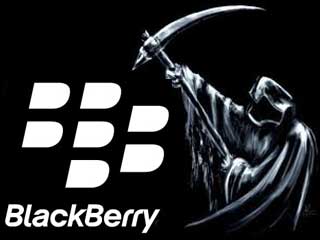 The news has been going from bad to worse over the last year for the Canadian manufacturer of the BlackBerry phones, Research in Motion, also known as RIM. It is no secret that RIM’s sales have suffered ever since the iPhone was originally released back in 2007. Since then, RIM has endured misstep after misstep and is on the verge of extinction. Let’s look at some of the low-lights over the last 12 months:
The news has been going from bad to worse over the last year for the Canadian manufacturer of the BlackBerry phones, Research in Motion, also known as RIM. It is no secret that RIM’s sales have suffered ever since the iPhone was originally released back in 2007. Since then, RIM has endured misstep after misstep and is on the verge of extinction. Let’s look at some of the low-lights over the last 12 months:
- The October 2011 BlackBerry outage was a huge PR nightmare for the already struggling company
- RIM announced earlier this year that that their upcoming BlackBerry 10 operating system would be delayed until fall 2012.
- RIM warned it would post a Q1 loss, its first operating loss in 8 years
- RIM’s stock slipped under $10/share, the lowest the stock has been since 2003, and down from it’s highpoint of $147.55 in 2008
- RIM’s announced loss for Q1 was significantly higher than expected
- RIM cut 30% of its workforce in an attempt to preserve its cash reserves
Even with all that, I gave RIM a sliver of hope that if they could survive until the fall of this year, the release of their BlackBerry 10 operating system before this Christmas holiday season might give them some sales that could keep them breathing for another year. But now, a couple of things have happened that I believe are the final nails in the coffin for this once great company.
First, RIM has just announced that the BlackBerry 10 operating system will now be further delayed until early 2013. This means that they will miss this year’s holiday season, effectively putting them another full year behind the iPhone. That by itself is a fatal blow. Start writing the eulogy because RIM is terminal.
If that wasn’t enough, it has been confirmed that carriers are negotiating to lower the fees they pay RIM for the BlackBerry service. These fees are charged to the carriers by RIM for every subscriber that uses a BlackBerry and accounts for one-third of RIM’s revenue. RIM can ill-afford to lose any revenue right now, but it is likely that the carriers have leverage against the struggling company. Consider that there are no such fees charged by Apple for their iPhones or Google for any Android-based phones or Microsoft for any Windows-based phones. The reality is that due to the legacy nature of the BlackBerry service, RIM must support infrastructure costs that Apple or Google or Microsoft do not. When BlackBerry was king of the Old World of Smartphones, carriers just had to deal with those fees. Now with RIM on the ropes, carriers probably know they can get lower fees. So if RIM loses even more revenue it will only accelerate the end.
The question is what does “the end” mean for the BlackBerry? RIM is rumored to be courting companies to buy them out. The question is who would want to buy them? What company could do anything better with the BlackBerry brand? It may be very possible that no company is truly interested. If this is the case, the end may come suddenly and abruptly for the BlackBerry, possibly leaving their users without e-mail service if some company or companies (perhaps the carriers) do not pick up the management of the BlackBerry service infrastructure. However, even if some company does buy out RIM, will the BlackBerry brand fare any better than the Palm brand did when HP bought them out? HP couldn’t gain any marketshare with their WebOS-based devices and completely killed the line last year. The tale of Palm’s WebOS and its fate with HP seem to be have many parallels with BlackBerry’s situation to this point. Companies may be heeding HP’s costly lesson which would explain why there is little interest in purchasing RIM. Any way you look at it, It seems certain that the days of the BlackBerry are numbered. If you currently depend on the BlackBerry, it would be wise to start planning a migration to another platform as soon as possible.